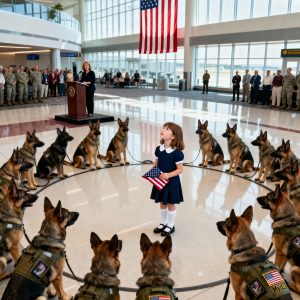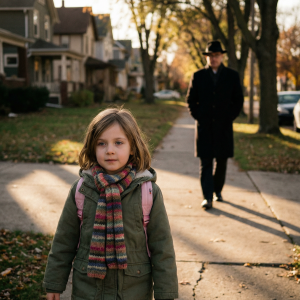The autumn morning in Cedar Falls brought the kind of crisp silence that makes small-town Sundays feel suspended in time. At 82, Samuel Richardson moved through his routine with the measured precision of someone who had learned long ago that structure keeps memories at bay. The prosthetic leg beneath his worn denim created an uneven rhythm as he walked, but his shoulders still carried traces of the military bearing that had once guided younger men through impossible situations.
A Morning That Changed Everything
The Copper Kettle Diner buzzed with its usual weekend energy when Samuel entered at half past ten. Veterans Day banners hung from the windows, their red, white, and blue promises of gratitude creating an ironic backdrop for what would unfold. He carried a simple breakfast tray — scrambled eggs growing cold, wheat toast, black coffee — searching for an empty table where he could honor a decades-old promise.
The faded ink on his weathered wrist told a story most would never recognize: a dagger piercing through an anchor, the unofficial mark of SEAL Team Bravo’s logistics division during Vietnam. These were the men who designed extraction routes under fire, who guided helicopters through enemy territory when radios failed, who brought wounded soldiers home when conventional methods had been exhausted.
But symbols mean nothing to those who refuse to see them.
The Weight of Judgment
The group at table twelve noticed him immediately. Three men in their forties, weekend warriors in American flag t-shirts who had never worn a uniform, began their commentary before Samuel had even chosen his seat. Their voices carried the casual cruelty of those who mistake loudness for authority.
“Look at that old-timer limping around,” one muttered over his pancakes. “Probably never saw a day of real combat in his life.”
Another leaned forward, studying Samuel’s careful movements. “That tattoo looks like prison work. Bet he’s just here for the free meal.”
The waitress, barely out of her teens, approached Samuel’s corner table with apologetic eyes. Her name tag read Jessica, and her hands trembled slightly as she delivered the request that would echo far beyond that Sunday morning.
“Sir, I’m really sorry, but some customers mentioned they’re uncomfortable. The manager wondered if you might consider moving to our outdoor seating area.”
Samuel looked up at her with the patience of someone who had weathered far worse storms. He nodded once, gathered his tray, and began the slow journey toward the door. The fork clinked against his plate with each step, a small percussion of dignity under assault.
Recognition in Uniform
Lieutenant Marcus Chen had been home on leave for exactly three days when he walked into the Copper Kettle. At 26, he carried himself with the controlled alertness that marked recent combat veterans — eyes that swept rooms automatically, posture that suggested readiness without advertising it.
Through the window, he spotted an elderly man sitting alone at a patio table, hunched over a barely touched meal. But it wasn’t the man’s solitude that stopped Marcus cold. It was the mark on his wrist, visible as a weathered hand lifted the coffee cup: a dagger through an anchor, etched in the faded blue-black of military ink from another era.
Marcus had seen that symbol before, in classified briefings about Vietnam-era special operations. SEAL Team Bravo, Detachment Bravo, the logistics specialists who had saved more lives than anyone bothered to count. The “Ghost Team,” instructors called them — the ones who got no glory but were the reason others made it home.
A Salute That Silenced a Room
Without hesitation, Marcus pushed through the patio door and approached the elderly veteran. “Sir,” he said, his voice carrying the respect reserved for legends. “Were you with Detachment Bravo?”
Samuel’s weathered eyes lifted, focusing with sudden sharpness. “Long time ago, son. Yeah, I was.”
Marcus straightened to full attention and delivered a textbook salute — crisp, unwavering, held with the pride of someone honoring a living piece of history. “Sir, they still teach your extraction protocols at Advanced Combat Training. You saved lives. You changed how we bring people home.”
The diner fell silent. Through the window, conversations stopped mid-sentence. Forks paused over plates as the weight of recognition settled over the room like a heavy blanket.
The Ripple Effect
What happened next transformed not just a morning, but an entire community’s understanding of service. Marcus turned toward the diner’s interior, his voice carrying the authority of someone who had earned the right to speak.
“This man designed the extraction routes that brought seventeen wounded soldiers out of hostile territory during Operation River Sweep. When communication systems failed, he guided rescue helicopters by memory, under direct fire. The mark he wears wasn’t bought in a shop — it was earned in blood and dedication.”
Inside, the men who had mocked Samuel’s appearance now sat in stunned silence. One by one, other diners began to stand — not in performance, but in the kind of recognition that arrives when truth cuts through assumption.
A Promise Kept at Last
Jessica, the young waitress, approached with tears in her eyes and a fresh cup of coffee. Her voice cracked as she spoke: “Sir, my grandfather served in Vietnam. His name was James Harrington. He… he never talked about the war, but he always said if he met his old team leader again, he’d buy him the best meal in town.”
Samuel’s hand went still. From his jacket pocket, he withdrew a creased photograph — two young soldiers in fatigues, standing beside a helicopter, both grinning with the invincibility of youth. “Jimmy Harrington,” he whispered. “He promised me we’d come here together when we got home. He didn’t make it back.”
The silence that followed wasn’t empty — it was full of understanding, of connections made across generations, of promises finally kept by proxy.
Legacy of Recognition
The story spread not through headlines but through the voices of those who witnessed it. Within days, veterans from across the region began visiting the Copper Kettle, not for discounts but for the recognition that had been missing for too long. The table where Samuel had been asked to leave became an informal memorial, decorated with small flags and photos of service members who never made it home.
Marcus maintained contact, sending handwritten letters that spoke not of military operations but of how old lessons continued to save new lives. Jessica learned everything she could about her grandfather’s service, carrying forward stories that had nearly been lost to silence.
The men who had mocked Samuel’s appearance never returned to the diner. But their absence created space for something better — a community that had learned to look beyond surface judgments and recognize the depth of sacrifice hidden in plain sight.
Samuel continued his weekly visits, no longer eating alone but surrounded by a growing circle of veterans, family members, and community members who had discovered that respect, once genuinely given, multiplies beyond measure. The promise James Harrington had made decades ago was finally fulfilled, not by the man who made it, but by a community that learned to honor those who had given everything for the freedom to gather, to speak, and to remember.
In the end, it took just one moment of recognition to transform years of invisibility into a legacy of honor — proof that some promises transcend time, and some sacrifices deserve to be seen, no matter how long it takes.





